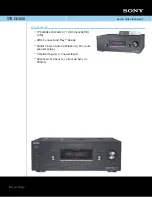
ENGLISH
- 43 -
9 - CONTROL UNIT
PD21 is provided with a display that, not only makes
programming simple, but also allows a continuous monitoring of
the input statuses; in addition, thanks to a menu structure, the
working schedule and the operation logic can be set easily.
In compliance with the European standards concerning electrical
safety and electromagnetic compatibility (EN 60335-1,
EN 50081-1 and EN 50082-1) it has been equipped with the low
voltage circuit total electric insulation (motors included) from the
network voltage.
Other characteristics:
• Power supply protected from short circuits within the
controller, on the motors and on the connected accessories.
• Adjustment of the power by partializing the current.
• Detecting obstacles
• Automatic learning of the limit switch position
• Tests for safety devices (photocells, safety ribbons and mosfet)
before each opening.
• Deactivation of safety inputs through the configuration menu:
no jumper is required for terminals concerning safety devices
that have not been installed, yet. You will only need to disable
this function from its relevant menu.
m
WARNING: Installation of control unit and safety
devices must be carried out with power disconnected
9.1 - POWER SUPPLY
The control unit must be fed by a 230V-50Hz electric line,
protected by a differential magnetothermal switch complying with
the law provisions in force.
Connect the power supply wires to terminals
L
and
N
on the
board located next to the transformer.
Connect the earth cable to terminal
W
9.2 - ACTIVATION INPUTS
The control unit PD21 has two activation inputs available, whose
functions depend on the programmed mode of operation (See
voice
Strt
on the programming menu):
Standard mode
: first input (START1) controls the opening, the
closing and the arrest depending on the programming mode set.
The second input (START2) causes the opening of the barrier
MASTER when it is activated the synchronized operation of two
barriers.
Open/Close and Dead Man mode
: an input command on
push-button START1 always commands the opening and an input
command on push-button START2 always commands the closing.
• In the
Open/Close
mode the command is of impulsive type,
that is, an impulse causes the total opening or closing of the
barrier.
• In the
Dead Man
mode, the command is of the monostable
type, that is the barrier opens or closes as long as the contact
is closed and arrests immediately if the contact becomes open.
Clock mode
: it is analogous to the standard mode, but the
barrier remains opened as long as the contact remains closed on
the input START1; when the contact comes opened begins the
pause countdown, which upon expiring the barrier recloses.
This function allows programming throughout the day the
opening hour cycles of the barrier, using for this an external timer.
It is indispensable to enable automatic reclosing.
m
ATTENTION: in all modes, the input commands must
be connected to devices with normally opened contacts.
Connect the cables of the device that commands the START1
input between terminals
K3
and
K2
of the control unit.
Connect the cables of the device that commands the START2
input between terminals
K4
and
K2
of the control unit.
The function associated to the START1 input command can
also be activated by pressing push-button
h
from outside the
programming menu, or by means of a remote control command
memorized on channel 1 (see the instructions of receiver MR).
The function associated to the START2 input command can
also be activated by pressing push-button
i
from outside the
programming menu, or by means of a remote control command
memorized on channel 2 (see the instructions of receiver MR).
9.3 - STOP
For greater safety it is possible to install a push-button that when
pressed causes immediate stop of the barrier. The switch must
have a normally closed contact that opens in case of set in action.
If the stop switch is set in action while the barrier is opened, the
automatic reclosing function becomes disabled; in order to reclose
the barrier it is necessary to give a start command (if the start
function in pause is disabled, it becomes temporarily reenabled in
order to allow the lock release of the barrier).
Connect the stop switch cables between cables
K1
and
K2
of the
control unit.
















































